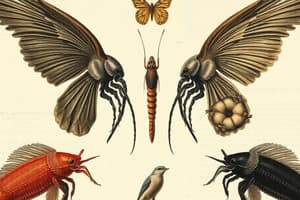Podcast
Questions and Answers
The Woods Hole Oceanographic Institution was founded in 1903.
The Woods Hole Oceanographic Institution was founded in 1903.
False (B)
Which marine station was established in Naples, Italy, in 1875?
Which marine station was established in Naples, Italy, in 1875?
- Scripps Institution of Oceanography
- Stazione Zoologica (correct)
- Marine Biological Laboratory
- Woods Hole Oceanographic Institution
Who directed the oceanography institute and museum founded by Prince Albert I of Monaco in 1906?
Who directed the oceanography institute and museum founded by Prince Albert I of Monaco in 1906?
Jacques-Yves Cousteau
In the early 20th century, ____ outfitted several yachts and larger ships that sampled the ocean.
In the early 20th century, ____ outfitted several yachts and larger ships that sampled the ocean.
Match the following institutions with their founding years:
Match the following institutions with their founding years:
Which documentary produced by Jacques-Yves Cousteau helped bring marine biology to the public eye?
Which documentary produced by Jacques-Yves Cousteau helped bring marine biology to the public eye?
What did Edward Forbes propose in his Azoic Hypothesis?
What did Edward Forbes propose in his Azoic Hypothesis?
Charles Wyville Thompson was involved in the HMS Challenger expedition.
Charles Wyville Thompson was involved in the HMS Challenger expedition.
Who founded the first marine biological laboratory in the United States?
Who founded the first marine biological laboratory in the United States?
The famous naturalist who made significant contributions to the study of marine invertebrates was __________.
The famous naturalist who made significant contributions to the study of marine invertebrates was __________.
Match the following naturalists with their contributions:
Match the following naturalists with their contributions:
What major discovery did the HMS Challenger expedition make?
What major discovery did the HMS Challenger expedition make?
Who is known as the Father of Biology and Zoology?
Who is known as the Father of Biology and Zoology?
James Cook was the first European to discover New Zealand.
James Cook was the first European to discover New Zealand.
Which naturalist developed the binomial nomenclature system?
Which naturalist developed the binomial nomenclature system?
The study of marine mammals falls under the branch of __________.
The study of marine mammals falls under the branch of __________.
Match the following naturalists with their contributions:
Match the following naturalists with their contributions:
What significant technique was developed during Michael Sars's time?
What significant technique was developed during Michael Sars's time?
Aristotle classified animals into two groups: vertebrates and mollusks.
Aristotle classified animals into two groups: vertebrates and mollusks.
What was one of the main findings from Charles Darwin's voyage on the HMS Beagle?
What was one of the main findings from Charles Darwin's voyage on the HMS Beagle?
The study of crustaceans like crabs and lobsters is called __________.
The study of crustaceans like crabs and lobsters is called __________.
Which scientist described nearly 250 kinds of marine animals?
Which scientist described nearly 250 kinds of marine animals?
Flashcards are hidden until you start studying
Study Notes
Marine Zoology Overview
- Marine zoology studies marine organisms, their behaviors, and environmental interactions.
Branches of Marine Zoology
- Ichthyology: Focuses on fish, including sharks, eels, and tuna.
- Cetology: Deals with marine mammals such as whales and dolphins.
- Malacology: Studies mollusks, e.g., octopuses and clams.
- Carcinology: Concentrates on crustaceans like crabs and lobsters.
- Herpetology: Explores marine reptiles, including sea turtles and iguanas.
- Cnidariology: Examines cnidarians such as jellyfish and corals.
- Planktology: Investigates planktonic organisms.
- Bryozoology: Focuses on bryozoans, also known as moss animals.
- Spongiogy: Covers the study of sponges.
- Astacology: Involves research on crayfish.
- Nematology: Studies nematodes or roundworms.
- Nemerteanology: Focuses on ribbon worms.
- Polychaetology: Explores polychaetes, such as fireworms.
- Ascidiology: Studies tunicates or sea squirts.
- Hirudinology: Concentrates on leeches.
- Platyhelminthology: Deals with flatworms.
- Marine Arachnology: Studies marine spiders.
- Marine Ornithology: Focuses on marine birds.
- Marine Entomology: Examines marine insects.
- Marine Protozoology: Studies marine protozoans.
- Marine Microbiology: Investigates marine microorganisms, including bacteria and fungi.
Historical Milestones in Marine Biology/Zoology
- 1200 BC: Homer references Phoenicians' ocean voyages in the Odyssey and Iliad.
- 384–322 BCE: Aristotle, known as the Father of Biology, documented over 500 marine species and classified animals into vertebrates and invertebrates.
- 1517-1564: Pierre Belon published works comparing marine life and human anatomy.
- 1507-1566: Guillaume Rondelet described around 250 marine animals in Libri de Piscibus Marinis.
- 1707-1778: Carolus Linnaeus developed binomial nomenclature and classified marine organisms.
- 1728-1779: Captain James Cook's voyages led to significant marine specimen collection.
- 1769-1832: Georges Cuvier developed a classification system categorizing animals into four major classes.
- 1805-1869: Michael Sars disproved the azoic theory, revealing life existed below 300 fathoms.
- 1809–1881: Charles Darwin explored diverse marine species during the HMS Beagle voyage.
- 1880s: Establishment of marine stations in England, Scotland, and Naples, Italy (Stazione Zoologica).
- Early 20th Century: Founding of prominent research institutions like the Scripps Institution and Woods Hole Oceanographic Institution expanded marine studies.
- 1815-1854: Edward Forbes questioned life's existence below 300 fathoms, impacting deep-sea research.
- 1830-1882: The HMS Challenger expedition provided a comprehensive view of marine life and ecosystems, uncovering numerous species and depths.
- End of 19th Century: Jean Louis Rodolphe Agassiz established the first marine biological laboratory in the U.S. at Penikese Island.
Studying That Suits You
Use AI to generate personalized quizzes and flashcards to suit your learning preferences.




